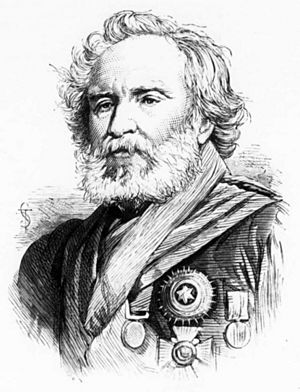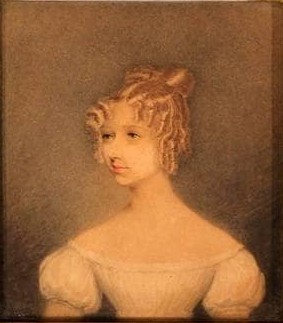John Low (East India Company officer) facts for kids
Quick facts for kids
John Low
|
|
|---|---|

The Late General Sir John Low (24 January 1880)
|
|
| Born | 13 December 1788 Clatto House, Fife |
| Died | 10 January 1880 (aged 91) Norwood, Surrey |
| Allegiance | |
| Service/ |
|
| Years of service | 1805–1857 |
| Rank |
|
| Battles/wars |
|
| Spouse(s) |
Augusta Shakespear
(m. 1829) |
| Children | 9 (see below) |
General Sir John Low (born 13 December 1788 – died 10 January 1880) was a Scottish army officer. He also worked as a political leader for the British East India Company. He played an important role in India during a time of big changes.
Contents
Early Life and Education
John Low was born in 1788 at Clatto House in Fife, Scotland. He was the oldest son of Captain Robert Low.
He went to St. Andrews University in 1802. In 1804, he got a special chance to join the Madras Army. This was part of the British East India Company's army in India.
Military Adventures
John Low started his army career in 1805 as a lieutenant. This is a junior officer rank. His first regiment was the 1st Madras Native Infantry. After a rebellion, his regiment was changed to the 24th Madras Infantry. Later, it became the 1st Madras Infantry again.
He moved up the ranks over the years. He became a captain in 1820 and a major in 1828. By 1834, he was a lieutenant-colonel. In 1854, he became a major-general. He reached the highest rank of general in 1867. He stayed with the 1st Madras Infantry for his whole career.
Low took part in several important military actions:
- He was part of the Java expedition in 1811. During this time, he was hurt while attacking Fort Cornelis.
- He worked in intelligence, gathering information for the army.
- He was at the Battle of Mahidpur in 1817. Here, the British defeated the Mahratta forces.
- After the battle, he helped bring peace to the Chindwarra district.
Political Roles in India
After his early military service, Low spent most of his time in political roles. He worked to manage relationships between the British and Indian rulers.
- He convinced the Mahratta ruler, Baji Rao II, to accept British protection. Low then became the British representative, called a Resident, in Baji Rao's new home.
- In 1825, he became a political agent in Jeypore. This meant he represented British interests there.
- He also served as Resident in Gwalior State and Lucknow.
In 1837, the East India Company wanted to take over the government of Oudh State. Low suggested a different plan. He thought they should replace the king with his son instead. When the king died suddenly, a different person tried to take the throne. Low acted quickly. He brought in a British regiment. They broke into the palace and arrested the pretender. Then, the rightful heir was made king. For his actions, Low was given an honor called the Companion of The Most Honourable Order of the Bath (CB) in 1838.
Low returned to the United Kingdom in 1842 because of his health.
He came back to India in 1847. In 1848, he became the governor-general's agent in Rajputana. He also worked as a commissioner in Ajmer-Merwara. In 1852, he moved to Hyderabad. There, he helped make a treaty. This agreement gave the Berar Division to the British. In return, the British would support the Hyderabad army.
In 1853, Low joined the governor-general's council. He had a lot of experience with Indian princes. When the Indian Rebellion of 1857 began, Low first suggested being gentle. But after outbreaks in Meerut and Delhi, he supported taking Delhi back.
Later Life and Family
Sir John Low returned to the United Kingdom in 1858. He received more honors for his service. He was made a Knight Commander of the Bath (KCB) in 1862. In 1873, he became a Knight Grand Commander of the Order of the Star of India (GCSI).
He passed away in Norwood, Surrey on 10 January 1880, at the age of 91. He was buried near his family home in Kemback, Fife.
He received several medals for his military service. These included medals for the Java expedition and the Battle of Mahidpur. He also received the Indian Mutiny Medal.
In 1829, John Low married Augusta Shakespear. She was the sister of Sir Richmond Shakespear, who worked with Low in Lucknow. They had nine children together:
- Susan Elizabeth Low (1830–1831)
- Emily Low (1832–1832)
- Charlotte Herbert Low (1833–1853)
- William Malcolm Low (1835–1923), who became a Member of Parliament. He is the great-great-grandfather of British politician David Cameron.
- General Sir Robert Cunliffe Low (1838–1911), who also became a British Indian Army officer.
- John Alwes Low R.N. (1840–1932)
- Irvine Low (1841–1881)
- Augusta Georgina Low (1844–1921)
- Selina Morison Low (1845–1927)
The story of John Low and his family is told in a book called The Tears of the Rajas.
Titles and Honours
 | Sharif Bey |
 | Hale Woodruff |
 | Richmond Barthé |
 | Purvis Young |


